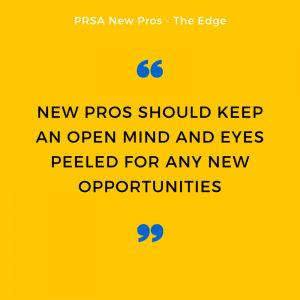Many of us approach looking for new opportunities as a necessity of job searching. We find a job, start off enthusiastically, become disappointed when it’s not everything we thought it would be, continue doing the job until we can’t anymore, and then desperately search for a new job. We repeat this vicious, frustrating cycle either because we only look for a new opportunity when we’re desperate for one, we don’t take the time to think about what we need or want in a career, or we don’t feel that turning down a job is an option.
 This is absolutely the wrong way to approach finding a fulfilling career. Instead of pursuing opportunities only when we think we desperately need them, new pros should keep an open mind and eyes peeled for any new opportunities, no matter how satisfying their current position may be.
This is absolutely the wrong way to approach finding a fulfilling career. Instead of pursuing opportunities only when we think we desperately need them, new pros should keep an open mind and eyes peeled for any new opportunities, no matter how satisfying their current position may be.
Actively looking around for what else is out there can help new pros decide what they want and don’t want in a career. Maybe there’s a great opportunity for a position with a well-known company that sounds like a dream available. If you ignore it just because you’re pretty happy with the job you have, you could be left wondering for the rest of your career if it was the one that got away. If you seek out an informational interview, you could find that it’s an opportunity you can’t pass up, that it’s not right for you—but is a great company—or that it’s just not a good fit at all. Early on in your career, learning more about a company or type of position is a great way to figure out what exactly you’re interested in and what you might like to explore more in-depth.
Keeping your options open also keeps you in control of your career. If you’re keeping an eye out for what else you could be doing, you can be the one to decide how long you’ll stay at a particular job—as long as your ‘looking’ is not negatively affecting performance in your current position. If you can juggle the job search while keeping up daily responsibilities, you can then decide if you want to keep learning and growing where you are or if you want to take a chance on another opportunity to grow your career. Being in the driver’s seat of your career is always a good place to be!
New opportunities often mean meeting new people, too. As you’re looking around at what else is available, you’re bound to make new connections with people you may not have met otherwise. Use informational meetings and events through professional organizations as a way to not only learn about new opportunities but to also build your network and strengthen your relationships. Actively reaching out to your network, new and old, will keep you the the front of their minds for any opportunities that might come end up in their emails.
While you’re at the top of new connections’ minds, you should also be keeping your skills fresh. Look at what skills open positions are looking for and make sure that you’re keeping up with the latest trends and skills. Making sure that you’ve brushed up on the skills employers are looking for can go a long way in helping you land the perfect position.
What else can you do to stay open to opportunities and land your dream job?
Write a call-to-action into your LinkedIn summary.
It can be as simple as a quick line saying that you welcome emails regarding new opportunities. Keep it short and sweet and let people know the best way to contact you.
Make a list of your dream employers & contact them.
Find connections at these companies and ask for an informational interview to learn more about the company, its culture and any relevant opportunities. Even if there’s not an opening at that time, meeting with and keeping in touch with a contact or two inside will keep you at the top of their list when positions do open.
Set up informational interviews & meetings when possible.
If there are companies you know you’d like to work for, people you admire or colleagues whose advice you value, reach out to them. Set up informational interviews with the first two to learn more about what they do and what opportunities might be available. For those whose advice you trust, an informal meeting over coffee, drinks or brunch is a great chance to catch up and talk in a relaxed setting.
Let people know when & what you’re looking for.
Even if you’re not actively looking for a new job, letting people know that you are open to new opportunities gives you new sets of eyes and ears to be on the lookout. Share your resume with those you trust and ask that they share information of new openings with you. If you are looking for a new job, let as many people as you can know, while not jeopardizing your current position. Spread the word privately to close connections, rather than publicly where your current employer may see.
Keep checking job postings.
Sometimes it can be fun to see what else is out there and what better way than checking job posting sites. If you want to make it even easier, sign up for weekly or monthly emails from PRSA Jobcenter, Indeed or any other job boards with specific keywords relating to what you’re looking for and where.
Ro byn Rudish-Laning is a member of PRSA SC and communications coordinator for the South Carolina Council on Competitiveness. Robyn is also a member of the New Professionals executive committee. She is a graduate of Duquesne University and is currently located in Columbia, SC. Find her on LinkedIn or Twitter or read her PR-focused blog.
byn Rudish-Laning is a member of PRSA SC and communications coordinator for the South Carolina Council on Competitiveness. Robyn is also a member of the New Professionals executive committee. She is a graduate of Duquesne University and is currently located in Columbia, SC. Find her on LinkedIn or Twitter or read her PR-focused blog.

 The first thing to look at is if there is room for improvement in your current role. Figure out what it is that you like and dislike about your role, and how you could potentially address the dislikes. Often time’s employees are so hesitant to speak up to their managers about their dislikes on the job, when in reality, their managers may be able to help you see a way to make it more enjoyable.
The first thing to look at is if there is room for improvement in your current role. Figure out what it is that you like and dislike about your role, and how you could potentially address the dislikes. Often time’s employees are so hesitant to speak up to their managers about their dislikes on the job, when in reality, their managers may be able to help you see a way to make it more enjoyable.

